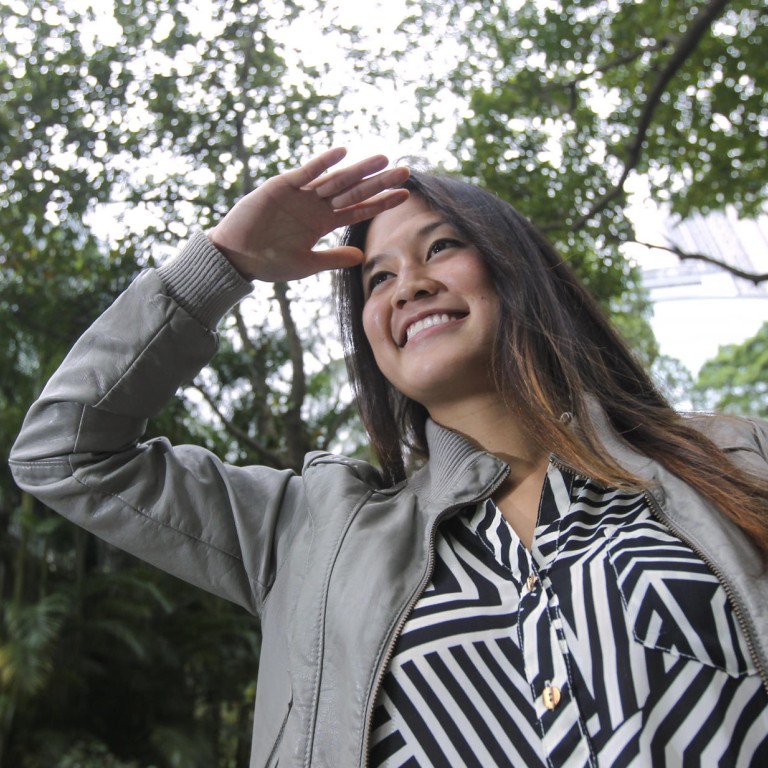
Environmentalist calls for help building online database of Hong Kong's wildlife
Fascinated by Hong Kong's natural treasures, photographer Laurel Chor is building a database of local wildlife and wants the public to join in the quest
Environmentalist and rising photographer Laurel Chor Lik-fung is fortunate to have supportive parents.
They backed her when she took a gap year and visited South America and Africa, volunteering at orphanages and working with disabled children.
After she completed her studies in international health and development at Georgetown University in the US, they got behind her decision to join a team of World Wildlife Fund experts to study gorillas in the Central African Republic.
Your actions are important, as they send a message to others
That was in 2012. No one anticipated that rebel forces would later overrun the strife-torn country, forcing the team to pull out in a hurry.
"It was me and four other foreign women," Chor says. "We were crossing international borders via the river, and people started firing at us. And at that moment, I thought to myself, 'What have I done. We've been captured by rebels.'"
Luckily, the gunmen turned out to be border guards and the women were transported to safety, although they had to leave their research and evacuate the country.
Chor, 24, returned to Hong Kong last year and began to see her hometown in a new light.
She also gained fresh appreciation of her family's trust in her ability to take care of herself: "Now I realise how young I was when I first took off to Africa. My parents are good at hiding their worries."
Taking the opportunity to explore nature trails that she had only heard about, Chor also found fresh appreciation of the wealth of flora and fauna found in a city largely viewed as a concrete jungle.
Chor discovered that Hong Kong was one of the last havens for endangered species such as the black-faced spoonbill (one of the world's rarest, with only 2,000 left), and the golden coin turtle, which is now only found in the wild within its borders.
In the course of research, however, she could not find a register of species endemic to Hong Kong. "So I thought, I'll do it," she says - that is, try to build a record all native fauna.
That is how she came to start Hong Kong Explorer's Initiative - a crowd-based campaign to build an online database on local wildlife. The idea is to encourage the public to explore Hong Kong's countryside - 75 per cent of the city is green - and document what they see.
Her venture got a jumpstart from the National Geographic Society through its Young Explorers Grant, which supports innovative research, exploration or conservation projects by people between 18 and 25.
Chor has since hosted several excursions, including bird-watching in Mai Po, a two-day kayaking trip around Hoi Ha Wan, and an exploration of remote trails in Sai Kung.
Most participants work full time, but if more can document their observations and upload photos of findings, she says, the information accumulated could become a significant database on Hong Kong wildlife.
The only way to scale up the project is to build on the concept of citizen science - having lay people contribute scientific data.
"If the database gets really big, the true accomplishment would be to persuade people to get out [and explore the outdoors] because Hong Kong is an amazing place," she says.
About 40 per cent of the area is protected land. But Chor worries that builders will extend construction into precious country parks. "Without informing people, people won't know how to appreciate it, let alone protect it," she says.
Ecological consultant Martin Williams shares her concerns, citing plans for developments on Lantau and in country park enclaves. He also applauds Chor's efforts to document endemic species.
"More Hongkongers are interested in the environment, but too few still go out and experience nature," he says. "So it's great to have a project that highlights Hong Kong's wildlife."
Inspired by her idol, the renowned primatologist Jane Goodall, Chor says she wants to channel the same spirit of devotion in spreading environmental consciousness. She serves as an ambassador for the Jane Goodall Institute, volunteers at the Ocean Park Conservation Foundation, where she is occasionally called in to perform autopsies for dolphins that have been washed ashore. In between, she is also working on documentary on the ivory trade.
"I find it heartbreaking that people don't appreciate the environment," she says. "I didn't grow up appreciating it. It's just not part of the people's lifestyle to hike and get out there."
Now, like Goodall, she has been speaking to students, at the Hong Kong and Australian international schools, for example, to promote greater awareness about local wildlife and to publicise her initiative. "The kids range from five to 18 and they are fascinated to learn how amazing the wildlife is. They especially love looking at pictures of the animals."
There's a lot people can do to help protect Hong Kong's natural treasures, Chor says.
"The thing about living in a small city is that you do have a voice. Some people underestimate the power of that voice.
"Just by going on a hike, you are showing that you value these resources. Your actions are important, as they send a message to others."
